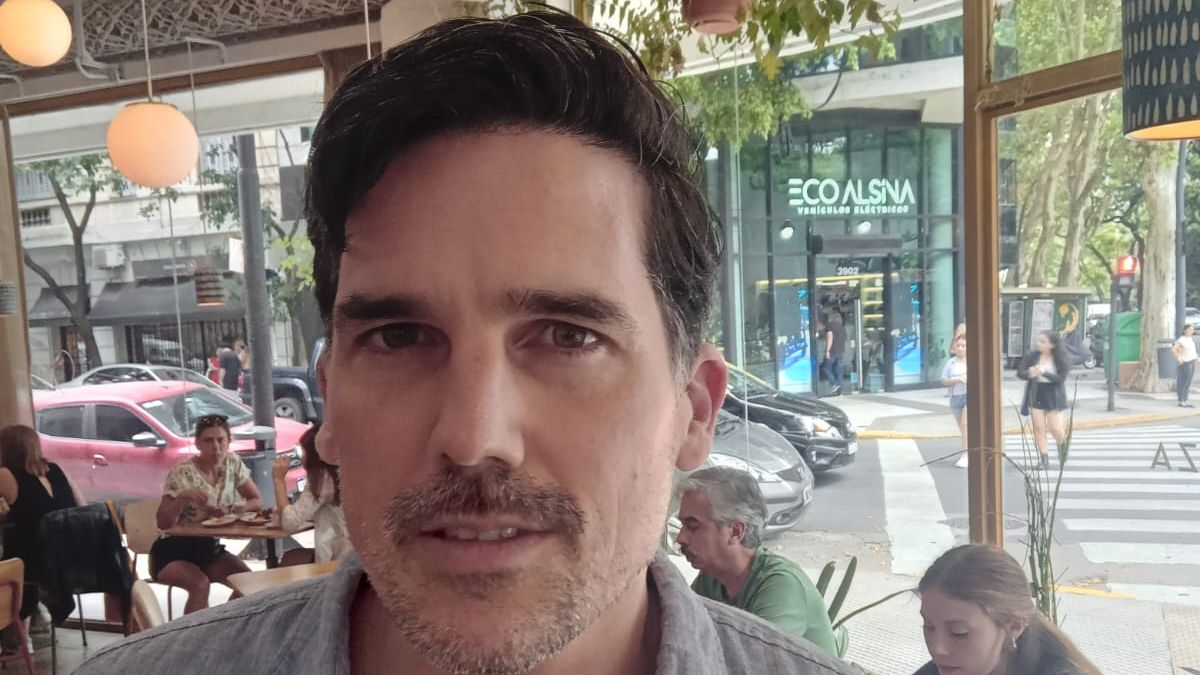A biology professor appears dead, the judicial investigation begins to discover that the case has the most diverse links. The dead man has had tough scientific confrontations about albinos, he is surrounded by mafias and there are ties to corruption in power, misdeeds of justice, drug and human trafficking networks, beings as humble as they are anomalous, in the absolutely Buenos Aires police officer by Pablo Maurette “The Golden Girl” (Anagrama). Maurette He is a professor at the Florida National University (USA) and in its branch in Italy, he teaches English and Comparative Literature. He published four books of philosophical essays and the novel “The migration”. During his visit to his country, we spoke with him.
Journalist: The murder of a biology teacher, and the judicial work to solve the crime, leads him to add the fantastic and the strange to the thriller, with nods to Borges and Jung, in a novel that has certain contacts with “The Secret of his eyes”.
Pablo Maurette: The setting is what I liked most about “The Secret in Their Eyes”, the way it portrays the world of the Courts, allowing itself to go in the opposite direction to the classic Anglo-Saxon police, to which we are accustomed, where the investigation is carried out a detective. In Argentina that is not the case, that task is carried out by the prosecutor’s office and sometimes by the judge, depending on the case, the dynamics and operation are different. The movie has something that I really liked. It made me think that to write an Argentine police officer you had to get involved with the dynamics between the prosecutor’s office and the police. And since “The Golden Girl” is a very Buenos Aires novel, there are meetings in bars, in second-hand bookstores, unusual people who know a lot about totally absurd topics, all that makes Buenos Aires totally peripheral and at the same time cosmopolitan, that’s why the novel can go from Rio to Budapest, Africa or La Rioja. The Borgesian aleph is here in Buenos Aires, at the end of the world.
Q.: The Borgesian aspect is also in the investigations of the murdered professor and his investigations into albinos, which end up leading to sordidity and black magic.
P.M: There is sleaze, superstition and scientific thought, at the same time. Sorrow is part of life, of the world, of literature. Portraying the horror of reality and only its horror does not work well because one ends up anesthetized, there has to be a counterbalance: humor, tenderness, understanding and kindness, what the sectarian prosecutor feels when the dwarf prostitute who protects the albino boy appears to testify. . It is true, in the theories about albinos and albinism there is a Borgesian nod.
Q: In your essay work, did you work on the theme of albinos, of the anomalous, of corruption?
P.M: Now I’m writing a book focused in part on a monstrous birth. I discovered the theme of albinos while reading something else and it was one of the starting points for the novel; another, and more important, the key theme of the police: the power and corruption of institutions. What interests me about corruption is that it is something that anyone can commit. There are no corrupt or non-corrupt people, there are people who do things well and one day have to do something wrong, and there are corrupt people who suddenly do things honestly; It is a continuum rather than black and white.
Q: It shows it in the novel…
P.M: There are those who, through justice, want to do things well and the circumstances overcome them and they are not going to put their lives or their profession at risk and they can let some things pass with a certain lightness. In the Anglo-Saxon police, justice comes in some form, this is not our case. The only character in the novel who is more convinced of not making concessions is the protagonist, the tax secretary Silvia Rey, who has the only kind of heroism conceivable: ethical commitment to her work, wanting to do it well at all costs.
Q: How does that high school teacher who wants to devote himself to a personal biological theory, and for that purpose illegally obtains corpses to study in his department, find Doliner?
P.M: While doing doctorates and postgraduate degrees, I met people who had the ambition of having an academic career and ended up teaching in schools. Doliner has the frustration of not belonging to an important research center, of not being in a faculty; He does not give up, he wants to leave a mark in the history of science, an absurd ambition. He has all his libido invested in his research and has no structure or support, he has nothing and sometimes resorts to illegality, it is another case of friction between the legal and the illegal, the moral and the immoral.
Q: Does your case change from what is discovered, your relationship with an albino teenager taxi boy?
P.M: The victim becomes a madman, a degenerate, a pedophile, a despicable being. Only Silvia Rey refuses to believe it and is determined to solve the crime, to know who killed him and why.
Q: Is this novel related to “Migration,” your first work in fiction?
P.M: No, the previous one is a dystopian novel about a guy who mysteriously disappears in Chicago while studying the case of a researcher in the history of religions, from 20th century Romania, and the belief in the transmigration of souls. Twenty-five years later, his friends receive a folder with his notes and diaries and begin to try to reconstruct what happened. It takes place in Buenos Aires in 2041 with time jumps and essayistic digressions.
Q.: In “The Golden Girl” there are African cults and the game of knitting with chance offering another way of knowing. What are you writing now?
P.M: A very different novel. An important part takes place in the 17th century, in Buenos Aires in 1630. It begins with a false autobiography, has elements of a historical novel and slides towards the fantastic.
Source: Ambito
I am an author and journalist who has worked in the entertainment industry for over a decade. I currently work as a news editor at a major news website, and my focus is on covering the latest trends in entertainment. I also write occasional pieces for other outlets, and have authored two books about the entertainment industry.




